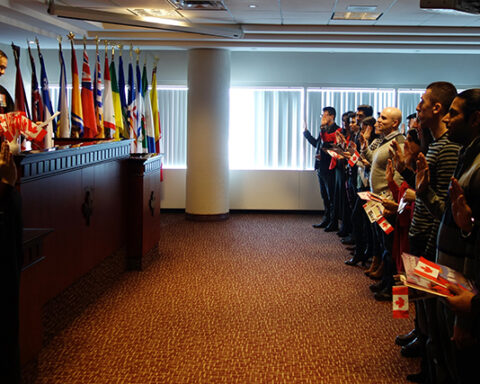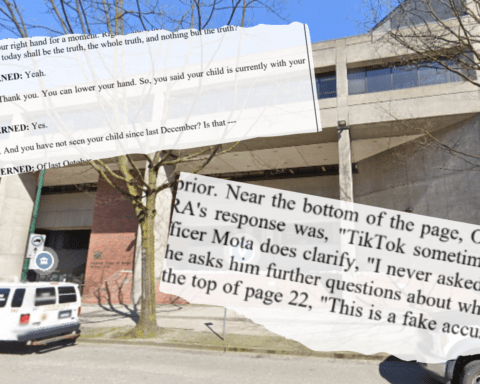The reforms of Ministers Jason Kenney and Chris Alexander have focused on reducing fraud and abuse in the immigration system. Previous governments downplayed such concerns, in favour of a more facilitative approach. However, we may be going too far in ensuring fool-proof integrity, while extending processing times well beyond the reasonable.
Yet, improved citizenship integrity is important to ongoing public support for relatively open citizenship regime.
Thus, for Kenney: “We will not stand by and allow people to lie and cheat their way into becoming citizens.”
And, Alexander, “On citizenship, the 1977 Act opened the door to significant abuse. Thousands of persons obtained citizenship by pretending to live in Canada, without actually having any intention to live here. Until 2009, little was done to curtail this.”
Most fraud relates to applicants not having met their citizenship residency requirements (previously three out of four years, now four out of six). Other areas include concealing criminal inadmissibility and identity fraud.
The pie chart pictured above indicates the country of birth of those suspected of citizenship fraud (not the place/visa office where the fraud occurred).
We do not have information regarding the country of immigration but anecdotally, we know that is a particular problem in Persian Gulf countries, given the richer employee benefits for Canadian citizens compared to Asian citizens.
But how large a problem is it? Does the government have hard information?
Fraud Statistics |
||
| Type | Number | Percentage |
| Number of fraud investigations |
3,194 |
1.86% |
| Number of withdrawn applications |
1,894 |
1.10% |
| Number of revocation notices or letters |
821 |
0.48% |
| Total number of revocations (all reasons) |
31 |
0.02% |
| Total number of revocations (fraud investigations) |
12 |
0.01% |
| Additional number of suspected fraud |
4,400 |
2.57% |
| Permanent Residency fraud investigations |
5,000 |
1.87% |
Extent of deception
The government has not released figures regarding which years the investigations refer to, or which years citizenship applications were withdrawn. The ‘known’ fraud percentage likely overstates the extent of fraud, balanced by the ‘unknown unknowns’ cases of fraud.
85 per cent of investigations target those living outside Canada (residency fraud). 90 per cent of cases typically end up in court.
While we have hard information in terms of number of investigations and withdrawn applications, we do not know yet how many of those investigations will lead to revocation or convictions. In addition to increased investigations, a number of other changes have taken place: citizenship tests are now changed and rotated on a regular basis, to reduce the risk of memorization; a more rigorous and consistent approach to language testing, culminating in pre-qualification of language competency has been implemented; and need to prove place of residence.
While we have hard information in terms of number of investigations and withdrawn applications, we do not know yet how many of those investigations will lead to revocation or convictions.
The cumulative effect of all these changes is enhanced integrity, but at the cost of an increased burden on applicants. Processing time for citizenship applications has increased to an average of more than two years.
Improving integrity
How will the recent changes to the Citizenship Act further improve integrity?
Supporters and critics of the changes agree that defining residency as being physically present provides welcome clarity. This change, along with the requirement to submit tax returns, should largely eliminate residency misrepresentation. The intent-to-reside provision is largely redundant given these changes.
Similarly, removal of pre-permanent residency time and expansion of language and knowledge testing to younger (14-17) and older (55-64) applicants will likely have no impact.
However, a number of other changes are significant and reinforce the overall message of reducing fraud.
Regulation of citizenship consultants, along with stiff fines (up to $100,000) and prison terms (up to two years) for misrepresentation, should act as a deterrent.
A ban on reapplying for citizenship for five years in case of material representation or withholding of relevant information also sends a strong signal, as does a ban or reapplying for 10 years in cases of revocation for fraud or misrepresentation.
Permanent residents who have not met their conditions of permanent residency are barred from applying for citizenship.
Government overreach
But government overreach can be seen in the new revocation provisions for fraud and misrepresentation.
Frustrated by the 90 per cent of cases that were referred to the Federal Court, the Act replaces the courts with Ministerial administrative discretion to “prevent spurious litigation” in Minister Alexander’s words.
Citizens no longer have automatic recourse to the courts and have to seek leave for the court, essentially on narrow legal grounds with no possibility to introduce new material facts.
Moreover, as in other areas of administrative law such as disability programs (Tribunal can deny in-person appeals in disability benefits cases), there is no right to an oral hearing. Even supporters of the government were critical on this lack of due process.
The expected expansion of “exit controls” beyond Canada-U.S. in coming years would reduce the burden on applicants to demonstrate their time in Canada.
In the meantime, this impacts on the work and personal plans of some who have already submitted their applications.
Prof. Trudo Lemmons of University of Toronto, caught in the system, noted “It’s really irritating and makes me think, if my file appears difficult to evaluate, how tough must it be for people from ‘suspect’ countries, or people who don’t necessarily have the same stable employment.”
Integrity and accessibility need to be balanced. Both Ministers Kenney and Alexander have stressed integrity, correcting a previous imbalance favouring accessibility.
Integrity and accessibility need to be balanced.
However, the government may have overstated the extent of citizenship fraud.
Zero tolerance
Even assuming all investigations will confirm fraud (not a given), adding the number of withdrawn applications, and assuming that all fraud investigations pertain to the same year (improbable), one arrives at a potential maximum fraud rate of around three per cent. The low number of revocations resulting from the investigations, suggests that it is significantly less.
It is regrettable that Citizenship and Immigration Canada (CIC) declined to provide updated numbers to substantiate the its case.
Some may argue that any fraud is unacceptable.
But the quest for perfection has to be balanced with the realities of efficient management and good service delivery.
There are more fraud issues with citizens originating in certain countries, both in terms of country of birth and likely country of application. From a risk management perspective, that is where the focus should be (and likely is).
As the government addresses the backlog and implements the new Citizenship Act, we will see starting in 2016 whether it has achieved a reasonable balance between reduced fraud, efficiency, and accessibility of citizenship, meeting the Minister’s commitment of a one-year processing time.
Andrew Griffith is the author of Policy Arrogance or Innocent Bias: Resetting Citizenship and Multiculturalism and is a regular media commentator and blogger (Multiculturalism Meanderings). He is the former Director General for Citizenship and Multiculturalism and has worked for a variety of government departments in Canada and abroad.
Andrew Griffith is the author of Multiculturalism in Canada: Evidence and Anecdote, Policy Arrogance or Innocent Bias: Resetting Citizenship and Multiculturalism and many other works. He is a former Director-General of Citizenship and Immigration Canada, Citizenship and Multiculturalism branch. He regularly comments on citizenship, multiculturalism and related issues, in this blog and the media.





